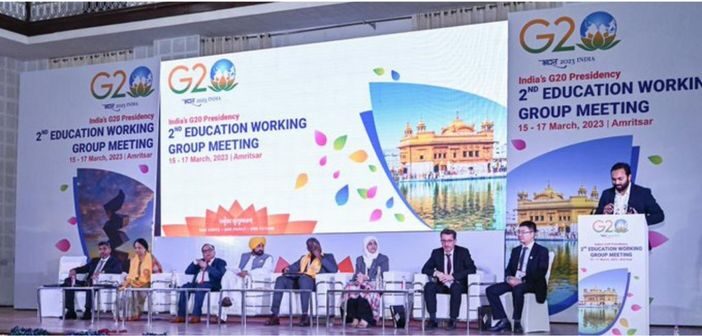Indian Institute of Technology (IIT) Ropar, under the Ministry of Education, organised a seminar on “Strengthening Research and Promoting Innovation via Richer Collaboration” at Khalsa College in Amritsar, on March 15th, 2023 where India’s G20 Presidency took centre stage. To address the future of work and innovation and build bridges between nations for equitable development, the event brought together delegates from the G20 Education Working Group.
The attendees were welcomed by Prof. Rajeev Ahuja, Director of IIT Ropar, who also stressed India’s opportunity to become a global leader in research and innovation.
Shri. K. Sanjay Murthy, Secretary of Higher Education, attended the event and emphasised the need for collaboration in research for achieving sustainable development. Prof. Govind Rangarajan, Director, IISC, provided insightful views on the interdependence of domains and the use of interdisciplinary methods for problem-solving. He also emphasised the importance of recognising and utilising grassroots innovation as well as the potential of India’s economic innovations to address problems facing the developed world.

Researchers from Australia, France, India, and the UK participated in the first panel, “Research in Emerging and Disruptive Technologies, Industry 4.0,” which was moderated by Prof. Anil Gupta and presided over by Prof. Rajeev Ahuja. During the discussion, panelists discussed how different stakeholders can support research on emerging innovations and their effects on educational systems and society as a whole.
The second panel, “Research in Sustainable Development Goals (SDGs),” moderated by Prof. Shalini Bharat and featured speakers from China, Oman, South Africa, the UAE, and UNICEF, emphasised strengthening university capacities as the hub of research.
Ms. Alison Dell, Assistant Secretary, Australian Government Department of Education, addressed the panel and highlighted the National Collaborative Infrastructure Scheme in her country, as well as the steps the government has taken to promote applied research. She highlighted the importance of international collaboration in research and innovation while emphasising previous instances of successful partnerships between Australian and Indian universities. She expressed her hope that these partnerships will thrive and contribute to the long-term growth of both countries.
The G20 seminar’s prime focus was to:
- Bridge the gap between government, academia, and industry to better design solutions to global challenges.
- Multidisciplinarity must be included in education.
- Countries and institutions needed to break down silos to promote translational research for reaching Sustainable Development Goals.
- Need to establish frameworks for exchanging research data and outcomes.
- The G20 countries should work to build a common framework for the effective use of emerging and disruptive technologies to address global challenges.
Also read: MSDE organised G20 webinar on “Mega Trends shaping the future of work” to discuss the dynamics of the changing workplace https://nationalskillsnetwork.in/msde-organised-g20-webinar-on-mega-trends-shaping-the-future-of-work-to-discuss-the-dynamics-of-the-changing-workplace/
Shri Bhagwant Mann, the Chief Minister of Punjab, delivered a speech at the end of the seminar. He welcomed the delegates and emphasised the importance of innovation and education. Shri Bhagwant Mann further commended the Government of India for giving Punjab the opportunity to host the G20’s second Education Working Group meeting.













